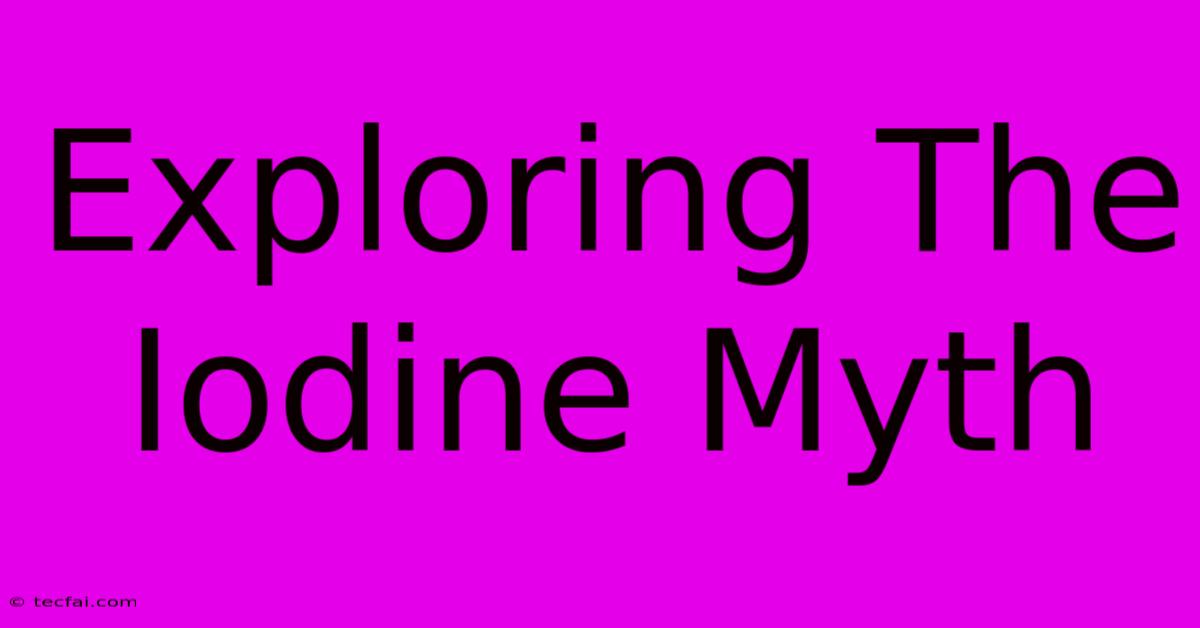Exploring The Iodine Myth

Discover more detailed and exciting information on our website. Click the link below to start your adventure: Visit Best Website tecfai.com. Don't miss out!
Table of Contents
Exploring the Iodine Myth: Separating Fact from Fiction
Iodine. The name conjures images of antiseptic solutions and fortified salt. But beyond its well-known role in preventing goiter, a complex web of misinformation surrounds this essential micronutrient. This article explores the common myths surrounding iodine, separating fact from fiction and highlighting the importance of a balanced approach to iodine supplementation.
The Myth of Universal Iodine Deficiency
One pervasive myth is the belief that everyone is iodine deficient. While iodine deficiency remains a significant global health concern, particularly in developing nations, claiming universal deficiency is a vast overstatement. Many developed countries have successfully implemented iodine fortification programs, resulting in adequate iodine levels for the majority of their populations. Simply assuming deficiency without proper testing can lead to unnecessary and potentially harmful supplementation.
Fact: Iodine deficiency is a real and serious problem in specific regions. However, it's crucial to assess individual needs through testing rather than relying on generalized assumptions.
The Myth of Iodine as a Miracle Cure-All
Another prevalent myth portrays iodine as a panacea for a wide array of health issues, ranging from weight loss to cancer prevention. While iodine plays a vital role in thyroid hormone production, which impacts numerous bodily functions, attributing miraculous healing properties to it is misleading and dangerous.
Fact: Iodine is essential for thyroid function, crucial for metabolic processes. However, it's not a cure for cancer, weight problems, or other complex health conditions. Promoting such claims is irresponsible and potentially harmful.
The Myth of High-Dose Iodine Supplementation
Many proponents of high-dose iodine supplementation claim it's beneficial for detoxification and various other health conditions. However, exceeding the recommended daily allowance can lead to serious health consequences, including iodine toxicity, which can manifest as symptoms like thyroid dysfunction, skin rashes, and digestive problems.
Fact: The recommended daily allowance of iodine varies depending on age and other factors. Always consult with a healthcare professional before considering iodine supplementation, especially at higher doses. Self-treating with high doses of iodine can be extremely hazardous.
The Importance of Responsible Iodine Intake
The key takeaway is that iodine is a vital nutrient, but its use must be approached responsibly. Avoid self-diagnosing iodine deficiency or resorting to unregulated supplements. Instead, follow these guidelines:
- Consult your doctor: Before considering iodine supplementation, discuss your needs with your doctor. They can order appropriate tests to assess your iodine levels and advise on the right course of action.
- Prioritize dietary sources: Many foods naturally contain iodine, including seafood, dairy products, and iodized salt. A balanced diet often provides sufficient iodine intake.
- Be wary of unverified claims: Approach claims about iodine’s miraculous properties with skepticism. Refer to reputable sources of medical information when researching this topic.
- Understand the risks of overconsumption: High doses of iodine can be harmful. Always adhere to recommended dosages.
By understanding the facts and separating them from the myths surrounding iodine, we can make informed decisions about our health and avoid the potential dangers of misinformation. Remember, responsible supplementation, informed by medical advice, is always the safest approach. Focus on a balanced diet and consult healthcare professionals for any health concerns.

Thank you for visiting our website wich cover about Exploring The Iodine Myth. We hope the information provided has been useful to you. Feel free to contact us if you have any questions or need further assistance. See you next time and dont miss to bookmark.
Featured Posts
-
Icelands Reykjanes Volcano Update
Nov 22, 2024
-
What Is Richard Coles Net Worth
Nov 22, 2024
-
6 M Banana Artists Statement
Nov 22, 2024
-
Hoarders Home Radioactive Waste
Nov 22, 2024
-
Princeton Swimming Meets Penn Cornell
Nov 22, 2024
